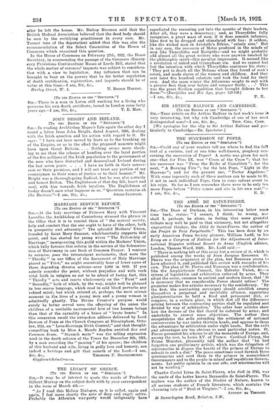THE ABA DE SAINT-PIERRE.
[To THE EDITOR Or TRE " SPECTATOR.")
Sio,—The Dean of Durham, in hie interesting letter some time back, states : "I cannot, I think, be wrong, nor shall 1, perhaps, be alone, in feeling that some grateful tribute may well be paid to that visionary, but not altogether unpractical thinker, the Abbe de Saint-Pierre. the author of the Pro jet de Pain Perpetuelle." This has been done by an early American Peace Society pioneer, William Ladd, in his Essay on a Congress of Nations for the Adjustment of Inter- national Disputes without Resort to Arms (English edition, London, Thomas Ward. 1840). Mr. Ladd said :—
" There is nothing left of this essay but a review of it, which is published among the works of Jean Jacques Rousseau. St. Pierre was the originator of the plan, but Rousseau seems to have admired it, and published this review with remarks of his own. The plan of St. Pierre and Rousseau was a confederation, like the Amphictyonic Council, the Helvetic Union, &e.—a system of legislation and arbitration enforced by arms. They adopt the error, common to ancient and modern times, that 'it is necessary that no considerable Power should refuse.' The projector makes five articles necessary to the confederacy. "By the first, the contracting sovereigns should establish among themselves a perpetual and inviolable alliance, appoint-is-1s plenipotentiaries to hold a fixed and permanent diet, or congress, in a certain place, in which diet all the differences arising between the contractisig parties shall be regulated and decided by way of arbitration.' The other four articles show how the decrees of the diet should be enforced by arms; and undertake to answer some objections. The author then recapitulates the evils attending the settlement of national controversies by war under thirteen heads, and opposes to them the advantages by arbitration under eight heads. But the evils and advantages are too obvious to need particular notice. St. Pierre presented his scheme to all the monarchs of Europe, and, among the rest, to Louis XV. of France. Cardinal Fleury, the Prime Minister, pleasantly told the author that '1w had forgotten one preliminary article, which was the delegation of missionaries to dispose the hearts of the princes of Europe to submit to such a diet.' The peace sometimes must furnish these missionaries and send them to the princes in monarchical Governments and to the people in mixed and republican Govern- ments. Let public opinion be on our side, and missionaries will not be wanting."
Charles Cartel Irene de Saint-Pierre, who died in 1743, was the uncle of the better known Bernardin de Saint-Pierre. The nephew was the author of the Studies of Nature, known to all serious students of French literature, which contains the charming tale of "Paul et Virginie."—I am, Sir, &c., 36 Somerlegton Road, Brixton, S.W. ANDREW RR Timms.


































 Previous page
Previous page